Boundary Violation in Mental Health
VerifiedAdded on 2023/01/23
|13
|3518
|77
AI Summary
This article discusses the concept of boundary violation in mental health and its impact on the nurse-patient relationship. It explores the importance of professional boundaries, the types of violations that can occur, and provides guidelines for maintaining ethical practices. The article also highlights the need for clear definitions and understanding of boundaries in mental health nursing.
Contribute Materials
Your contribution can guide someone’s learning journey. Share your
documents today.
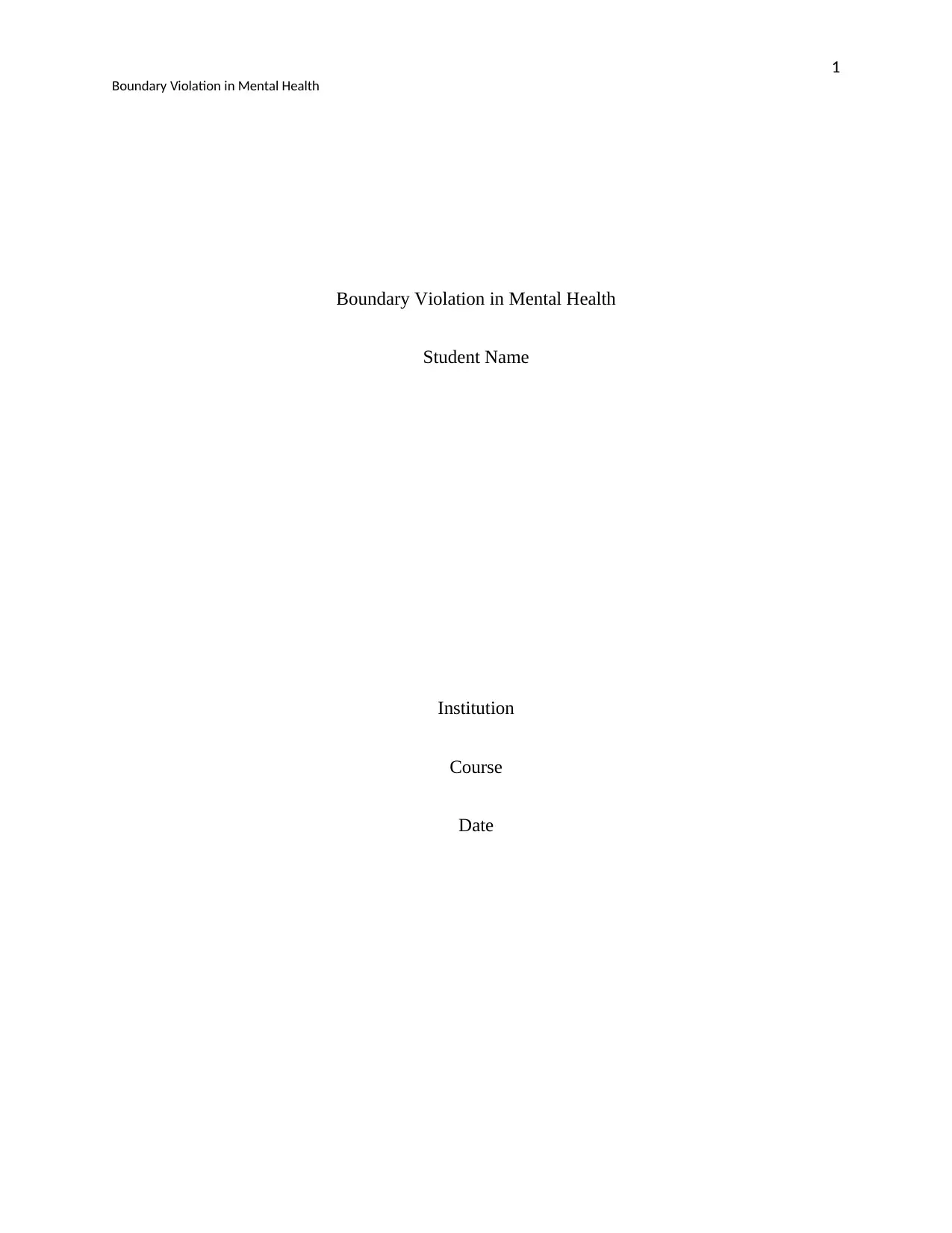
1
Boundary Violation in Mental Health
Boundary Violation in Mental Health
Student Name
Institution
Course
Date
Boundary Violation in Mental Health
Boundary Violation in Mental Health
Student Name
Institution
Course
Date
Secure Best Marks with AI Grader
Need help grading? Try our AI Grader for instant feedback on your assignments.
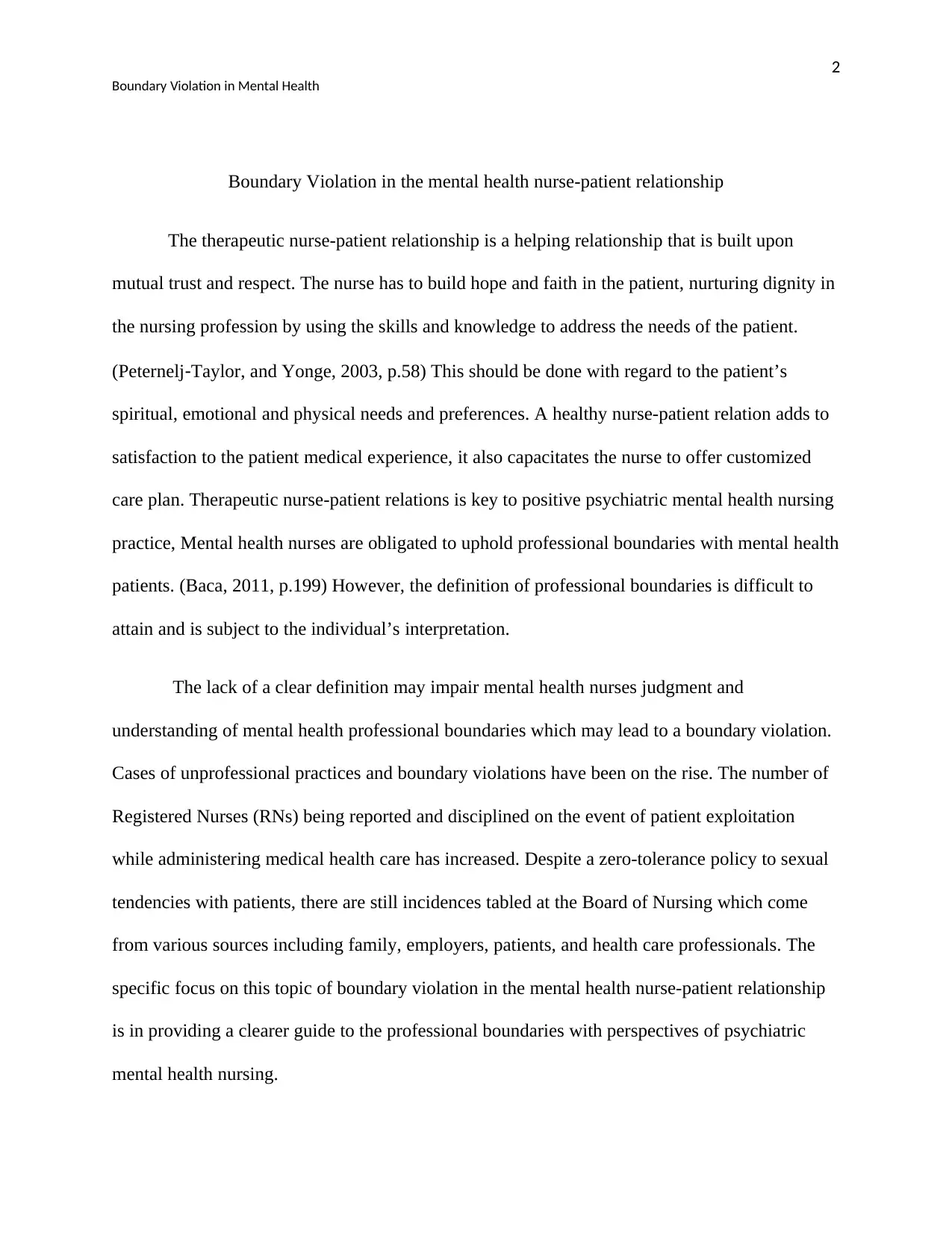
2
Boundary Violation in Mental Health
Boundary Violation in the mental health nurse-patient relationship
The therapeutic nurse-patient relationship is a helping relationship that is built upon
mutual trust and respect. The nurse has to build hope and faith in the patient, nurturing dignity in
the nursing profession by using the skills and knowledge to address the needs of the patient.
(Peternelj‐Taylor, and Yonge, 2003, p.58) This should be done with regard to the patient’s
spiritual, emotional and physical needs and preferences. A healthy nurse-patient relation adds to
satisfaction to the patient medical experience, it also capacitates the nurse to offer customized
care plan. Therapeutic nurse-patient relations is key to positive psychiatric mental health nursing
practice, Mental health nurses are obligated to uphold professional boundaries with mental health
patients. (Baca, 2011, p.199) However, the definition of professional boundaries is difficult to
attain and is subject to the individual’s interpretation.
The lack of a clear definition may impair mental health nurses judgment and
understanding of mental health professional boundaries which may lead to a boundary violation.
Cases of unprofessional practices and boundary violations have been on the rise. The number of
Registered Nurses (RNs) being reported and disciplined on the event of patient exploitation
while administering medical health care has increased. Despite a zero-tolerance policy to sexual
tendencies with patients, there are still incidences tabled at the Board of Nursing which come
from various sources including family, employers, patients, and health care professionals. The
specific focus on this topic of boundary violation in the mental health nurse-patient relationship
is in providing a clearer guide to the professional boundaries with perspectives of psychiatric
mental health nursing.
Boundary Violation in Mental Health
Boundary Violation in the mental health nurse-patient relationship
The therapeutic nurse-patient relationship is a helping relationship that is built upon
mutual trust and respect. The nurse has to build hope and faith in the patient, nurturing dignity in
the nursing profession by using the skills and knowledge to address the needs of the patient.
(Peternelj‐Taylor, and Yonge, 2003, p.58) This should be done with regard to the patient’s
spiritual, emotional and physical needs and preferences. A healthy nurse-patient relation adds to
satisfaction to the patient medical experience, it also capacitates the nurse to offer customized
care plan. Therapeutic nurse-patient relations is key to positive psychiatric mental health nursing
practice, Mental health nurses are obligated to uphold professional boundaries with mental health
patients. (Baca, 2011, p.199) However, the definition of professional boundaries is difficult to
attain and is subject to the individual’s interpretation.
The lack of a clear definition may impair mental health nurses judgment and
understanding of mental health professional boundaries which may lead to a boundary violation.
Cases of unprofessional practices and boundary violations have been on the rise. The number of
Registered Nurses (RNs) being reported and disciplined on the event of patient exploitation
while administering medical health care has increased. Despite a zero-tolerance policy to sexual
tendencies with patients, there are still incidences tabled at the Board of Nursing which come
from various sources including family, employers, patients, and health care professionals. The
specific focus on this topic of boundary violation in the mental health nurse-patient relationship
is in providing a clearer guide to the professional boundaries with perspectives of psychiatric
mental health nursing.
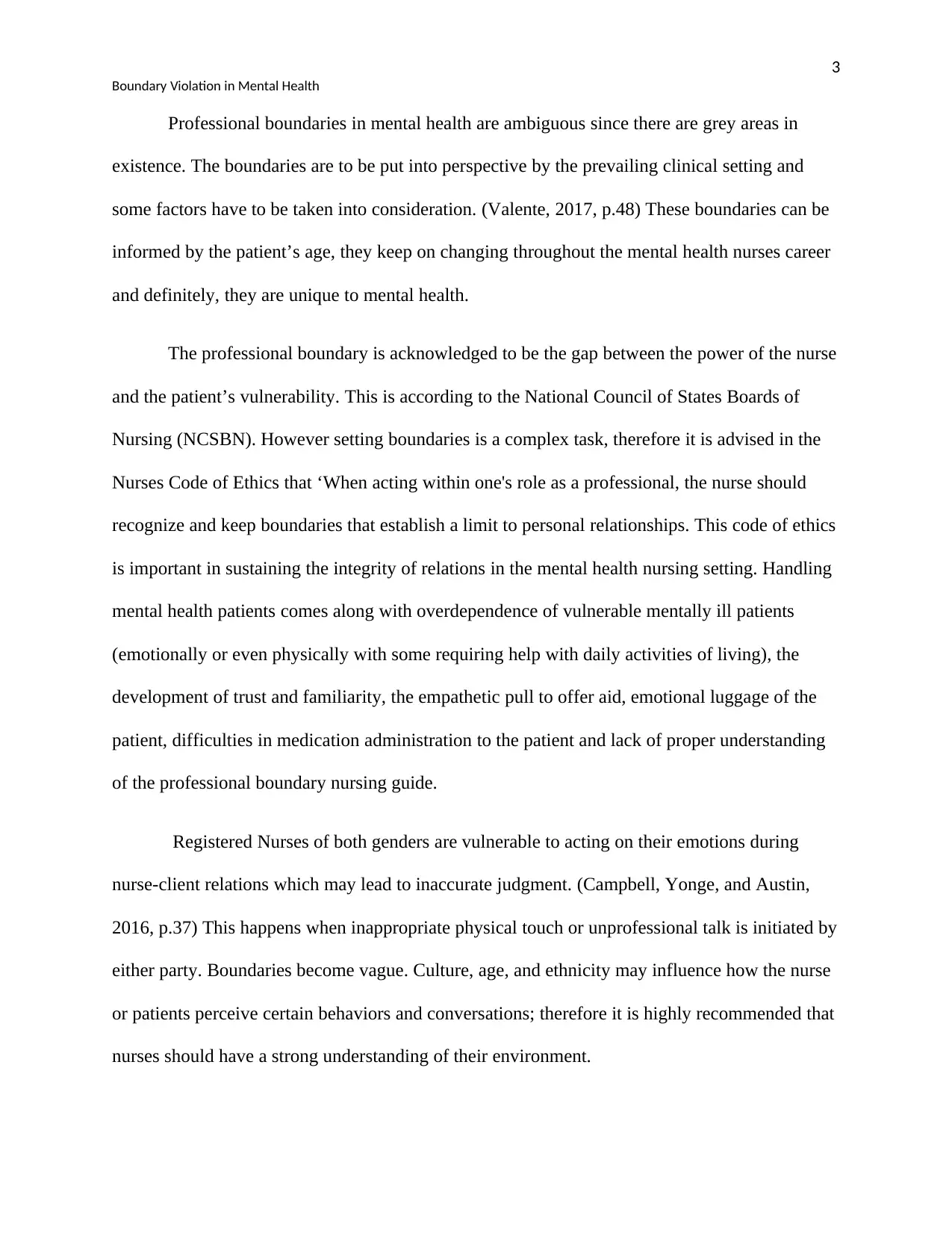
3
Boundary Violation in Mental Health
Professional boundaries in mental health are ambiguous since there are grey areas in
existence. The boundaries are to be put into perspective by the prevailing clinical setting and
some factors have to be taken into consideration. (Valente, 2017, p.48) These boundaries can be
informed by the patient’s age, they keep on changing throughout the mental health nurses career
and definitely, they are unique to mental health.
The professional boundary is acknowledged to be the gap between the power of the nurse
and the patient’s vulnerability. This is according to the National Council of States Boards of
Nursing (NCSBN). However setting boundaries is a complex task, therefore it is advised in the
Nurses Code of Ethics that ‘When acting within one's role as a professional, the nurse should
recognize and keep boundaries that establish a limit to personal relationships. This code of ethics
is important in sustaining the integrity of relations in the mental health nursing setting. Handling
mental health patients comes along with overdependence of vulnerable mentally ill patients
(emotionally or even physically with some requiring help with daily activities of living), the
development of trust and familiarity, the empathetic pull to offer aid, emotional luggage of the
patient, difficulties in medication administration to the patient and lack of proper understanding
of the professional boundary nursing guide.
Registered Nurses of both genders are vulnerable to acting on their emotions during
nurse-client relations which may lead to inaccurate judgment. (Campbell, Yonge, and Austin,
2016, p.37) This happens when inappropriate physical touch or unprofessional talk is initiated by
either party. Boundaries become vague. Culture, age, and ethnicity may influence how the nurse
or patients perceive certain behaviors and conversations; therefore it is highly recommended that
nurses should have a strong understanding of their environment.
Boundary Violation in Mental Health
Professional boundaries in mental health are ambiguous since there are grey areas in
existence. The boundaries are to be put into perspective by the prevailing clinical setting and
some factors have to be taken into consideration. (Valente, 2017, p.48) These boundaries can be
informed by the patient’s age, they keep on changing throughout the mental health nurses career
and definitely, they are unique to mental health.
The professional boundary is acknowledged to be the gap between the power of the nurse
and the patient’s vulnerability. This is according to the National Council of States Boards of
Nursing (NCSBN). However setting boundaries is a complex task, therefore it is advised in the
Nurses Code of Ethics that ‘When acting within one's role as a professional, the nurse should
recognize and keep boundaries that establish a limit to personal relationships. This code of ethics
is important in sustaining the integrity of relations in the mental health nursing setting. Handling
mental health patients comes along with overdependence of vulnerable mentally ill patients
(emotionally or even physically with some requiring help with daily activities of living), the
development of trust and familiarity, the empathetic pull to offer aid, emotional luggage of the
patient, difficulties in medication administration to the patient and lack of proper understanding
of the professional boundary nursing guide.
Registered Nurses of both genders are vulnerable to acting on their emotions during
nurse-client relations which may lead to inaccurate judgment. (Campbell, Yonge, and Austin,
2016, p.37) This happens when inappropriate physical touch or unprofessional talk is initiated by
either party. Boundaries become vague. Culture, age, and ethnicity may influence how the nurse
or patients perceive certain behaviors and conversations; therefore it is highly recommended that
nurses should have a strong understanding of their environment.
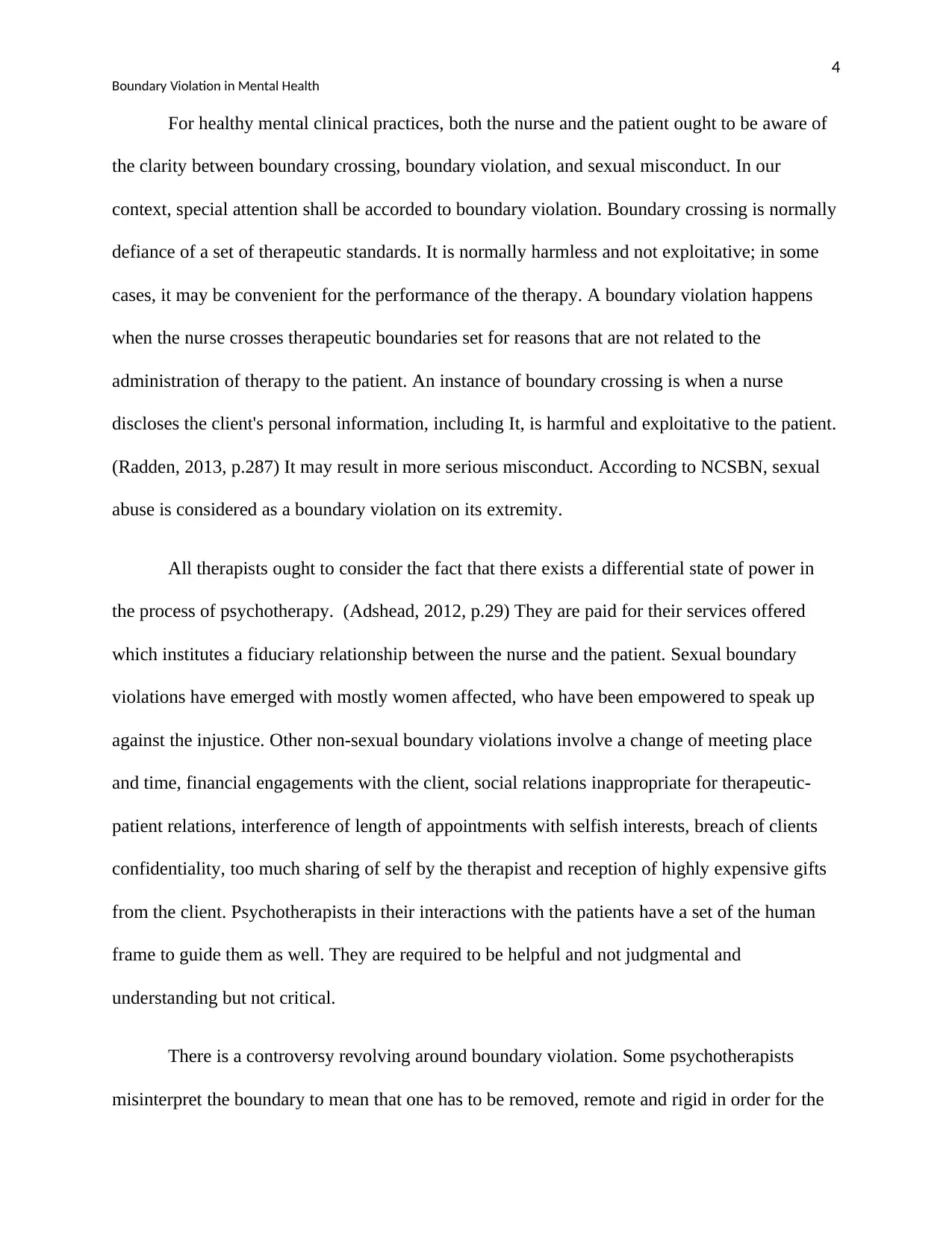
4
Boundary Violation in Mental Health
For healthy mental clinical practices, both the nurse and the patient ought to be aware of
the clarity between boundary crossing, boundary violation, and sexual misconduct. In our
context, special attention shall be accorded to boundary violation. Boundary crossing is normally
defiance of a set of therapeutic standards. It is normally harmless and not exploitative; in some
cases, it may be convenient for the performance of the therapy. A boundary violation happens
when the nurse crosses therapeutic boundaries set for reasons that are not related to the
administration of therapy to the patient. An instance of boundary crossing is when a nurse
discloses the client's personal information, including It, is harmful and exploitative to the patient.
(Radden, 2013, p.287) It may result in more serious misconduct. According to NCSBN, sexual
abuse is considered as a boundary violation on its extremity.
All therapists ought to consider the fact that there exists a differential state of power in
the process of psychotherapy. (Adshead, 2012, p.29) They are paid for their services offered
which institutes a fiduciary relationship between the nurse and the patient. Sexual boundary
violations have emerged with mostly women affected, who have been empowered to speak up
against the injustice. Other non-sexual boundary violations involve a change of meeting place
and time, financial engagements with the client, social relations inappropriate for therapeutic-
patient relations, interference of length of appointments with selfish interests, breach of clients
confidentiality, too much sharing of self by the therapist and reception of highly expensive gifts
from the client. Psychotherapists in their interactions with the patients have a set of the human
frame to guide them as well. They are required to be helpful and not judgmental and
understanding but not critical.
There is a controversy revolving around boundary violation. Some psychotherapists
misinterpret the boundary to mean that one has to be removed, remote and rigid in order for the
Boundary Violation in Mental Health
For healthy mental clinical practices, both the nurse and the patient ought to be aware of
the clarity between boundary crossing, boundary violation, and sexual misconduct. In our
context, special attention shall be accorded to boundary violation. Boundary crossing is normally
defiance of a set of therapeutic standards. It is normally harmless and not exploitative; in some
cases, it may be convenient for the performance of the therapy. A boundary violation happens
when the nurse crosses therapeutic boundaries set for reasons that are not related to the
administration of therapy to the patient. An instance of boundary crossing is when a nurse
discloses the client's personal information, including It, is harmful and exploitative to the patient.
(Radden, 2013, p.287) It may result in more serious misconduct. According to NCSBN, sexual
abuse is considered as a boundary violation on its extremity.
All therapists ought to consider the fact that there exists a differential state of power in
the process of psychotherapy. (Adshead, 2012, p.29) They are paid for their services offered
which institutes a fiduciary relationship between the nurse and the patient. Sexual boundary
violations have emerged with mostly women affected, who have been empowered to speak up
against the injustice. Other non-sexual boundary violations involve a change of meeting place
and time, financial engagements with the client, social relations inappropriate for therapeutic-
patient relations, interference of length of appointments with selfish interests, breach of clients
confidentiality, too much sharing of self by the therapist and reception of highly expensive gifts
from the client. Psychotherapists in their interactions with the patients have a set of the human
frame to guide them as well. They are required to be helpful and not judgmental and
understanding but not critical.
There is a controversy revolving around boundary violation. Some psychotherapists
misinterpret the boundary to mean that one has to be removed, remote and rigid in order for the
Secure Best Marks with AI Grader
Need help grading? Try our AI Grader for instant feedback on your assignments.
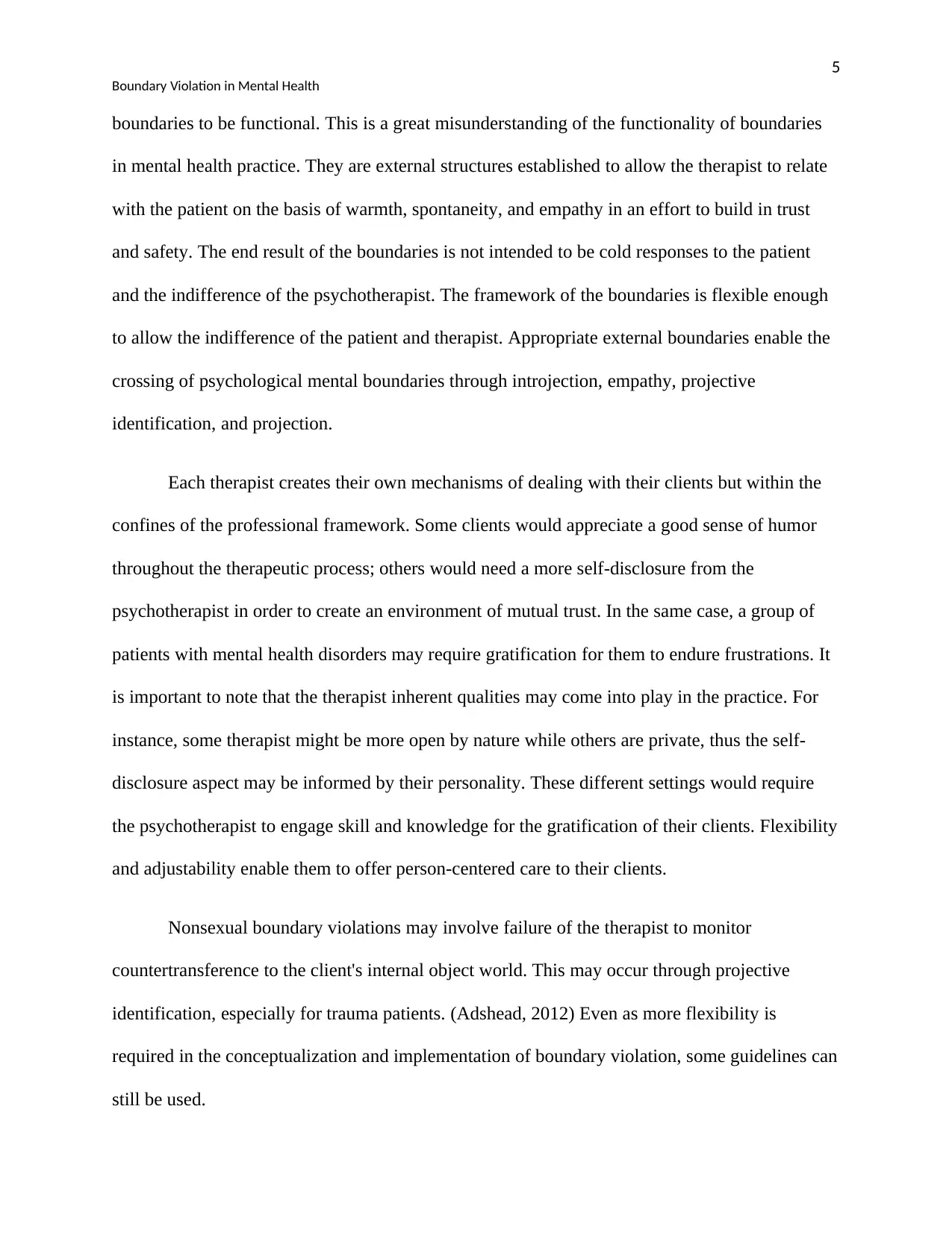
5
Boundary Violation in Mental Health
boundaries to be functional. This is a great misunderstanding of the functionality of boundaries
in mental health practice. They are external structures established to allow the therapist to relate
with the patient on the basis of warmth, spontaneity, and empathy in an effort to build in trust
and safety. The end result of the boundaries is not intended to be cold responses to the patient
and the indifference of the psychotherapist. The framework of the boundaries is flexible enough
to allow the indifference of the patient and therapist. Appropriate external boundaries enable the
crossing of psychological mental boundaries through introjection, empathy, projective
identification, and projection.
Each therapist creates their own mechanisms of dealing with their clients but within the
confines of the professional framework. Some clients would appreciate a good sense of humor
throughout the therapeutic process; others would need a more self-disclosure from the
psychotherapist in order to create an environment of mutual trust. In the same case, a group of
patients with mental health disorders may require gratification for them to endure frustrations. It
is important to note that the therapist inherent qualities may come into play in the practice. For
instance, some therapist might be more open by nature while others are private, thus the self-
disclosure aspect may be informed by their personality. These different settings would require
the psychotherapist to engage skill and knowledge for the gratification of their clients. Flexibility
and adjustability enable them to offer person-centered care to their clients.
Nonsexual boundary violations may involve failure of the therapist to monitor
countertransference to the client's internal object world. This may occur through projective
identification, especially for trauma patients. (Adshead, 2012) Even as more flexibility is
required in the conceptualization and implementation of boundary violation, some guidelines can
still be used.
Boundary Violation in Mental Health
boundaries to be functional. This is a great misunderstanding of the functionality of boundaries
in mental health practice. They are external structures established to allow the therapist to relate
with the patient on the basis of warmth, spontaneity, and empathy in an effort to build in trust
and safety. The end result of the boundaries is not intended to be cold responses to the patient
and the indifference of the psychotherapist. The framework of the boundaries is flexible enough
to allow the indifference of the patient and therapist. Appropriate external boundaries enable the
crossing of psychological mental boundaries through introjection, empathy, projective
identification, and projection.
Each therapist creates their own mechanisms of dealing with their clients but within the
confines of the professional framework. Some clients would appreciate a good sense of humor
throughout the therapeutic process; others would need a more self-disclosure from the
psychotherapist in order to create an environment of mutual trust. In the same case, a group of
patients with mental health disorders may require gratification for them to endure frustrations. It
is important to note that the therapist inherent qualities may come into play in the practice. For
instance, some therapist might be more open by nature while others are private, thus the self-
disclosure aspect may be informed by their personality. These different settings would require
the psychotherapist to engage skill and knowledge for the gratification of their clients. Flexibility
and adjustability enable them to offer person-centered care to their clients.
Nonsexual boundary violations may involve failure of the therapist to monitor
countertransference to the client's internal object world. This may occur through projective
identification, especially for trauma patients. (Adshead, 2012) Even as more flexibility is
required in the conceptualization and implementation of boundary violation, some guidelines can
still be used.
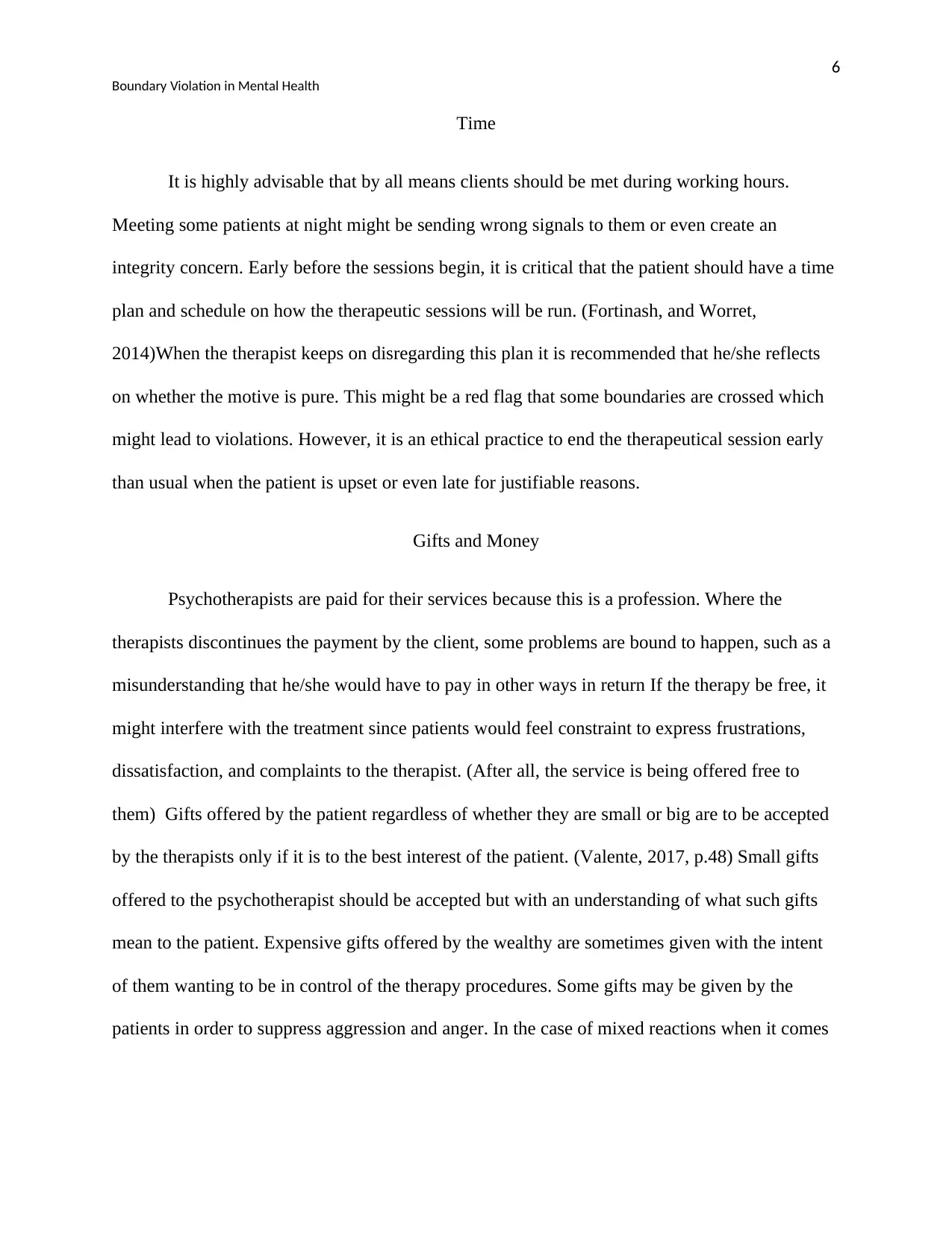
6
Boundary Violation in Mental Health
Time
It is highly advisable that by all means clients should be met during working hours.
Meeting some patients at night might be sending wrong signals to them or even create an
integrity concern. Early before the sessions begin, it is critical that the patient should have a time
plan and schedule on how the therapeutic sessions will be run. (Fortinash, and Worret,
2014)When the therapist keeps on disregarding this plan it is recommended that he/she reflects
on whether the motive is pure. This might be a red flag that some boundaries are crossed which
might lead to violations. However, it is an ethical practice to end the therapeutical session early
than usual when the patient is upset or even late for justifiable reasons.
Gifts and Money
Psychotherapists are paid for their services because this is a profession. Where the
therapists discontinues the payment by the client, some problems are bound to happen, such as a
misunderstanding that he/she would have to pay in other ways in return If the therapy be free, it
might interfere with the treatment since patients would feel constraint to express frustrations,
dissatisfaction, and complaints to the therapist. (After all, the service is being offered free to
them) Gifts offered by the patient regardless of whether they are small or big are to be accepted
by the therapists only if it is to the best interest of the patient. (Valente, 2017, p.48) Small gifts
offered to the psychotherapist should be accepted but with an understanding of what such gifts
mean to the patient. Expensive gifts offered by the wealthy are sometimes given with the intent
of them wanting to be in control of the therapy procedures. Some gifts may be given by the
patients in order to suppress aggression and anger. In the case of mixed reactions when it comes
Boundary Violation in Mental Health
Time
It is highly advisable that by all means clients should be met during working hours.
Meeting some patients at night might be sending wrong signals to them or even create an
integrity concern. Early before the sessions begin, it is critical that the patient should have a time
plan and schedule on how the therapeutic sessions will be run. (Fortinash, and Worret,
2014)When the therapist keeps on disregarding this plan it is recommended that he/she reflects
on whether the motive is pure. This might be a red flag that some boundaries are crossed which
might lead to violations. However, it is an ethical practice to end the therapeutical session early
than usual when the patient is upset or even late for justifiable reasons.
Gifts and Money
Psychotherapists are paid for their services because this is a profession. Where the
therapists discontinues the payment by the client, some problems are bound to happen, such as a
misunderstanding that he/she would have to pay in other ways in return If the therapy be free, it
might interfere with the treatment since patients would feel constraint to express frustrations,
dissatisfaction, and complaints to the therapist. (After all, the service is being offered free to
them) Gifts offered by the patient regardless of whether they are small or big are to be accepted
by the therapists only if it is to the best interest of the patient. (Valente, 2017, p.48) Small gifts
offered to the psychotherapist should be accepted but with an understanding of what such gifts
mean to the patient. Expensive gifts offered by the wealthy are sometimes given with the intent
of them wanting to be in control of the therapy procedures. Some gifts may be given by the
patients in order to suppress aggression and anger. In the case of mixed reactions when it comes
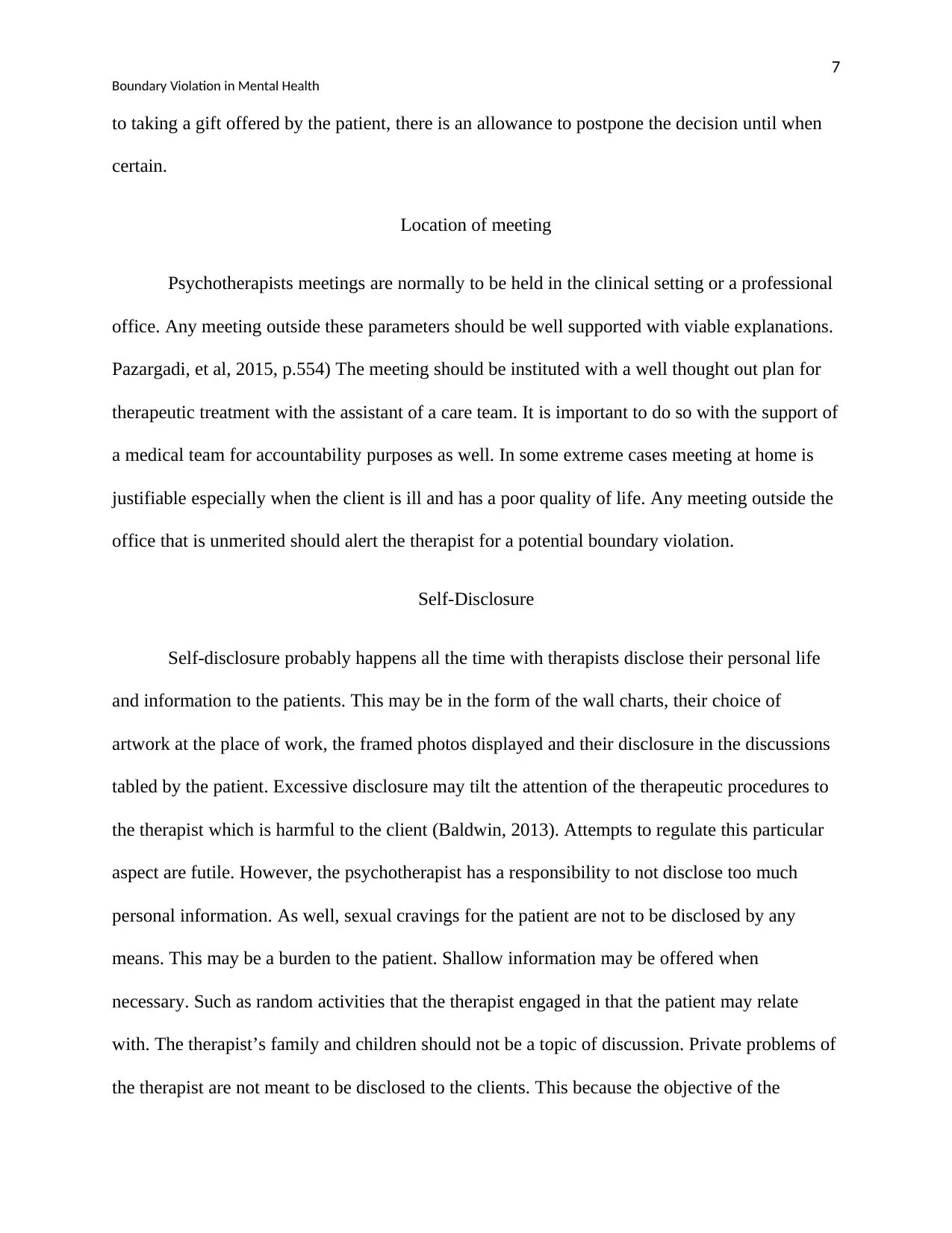
7
Boundary Violation in Mental Health
to taking a gift offered by the patient, there is an allowance to postpone the decision until when
certain.
Location of meeting
Psychotherapists meetings are normally to be held in the clinical setting or a professional
office. Any meeting outside these parameters should be well supported with viable explanations.
Pazargadi, et al, 2015, p.554) The meeting should be instituted with a well thought out plan for
therapeutic treatment with the assistant of a care team. It is important to do so with the support of
a medical team for accountability purposes as well. In some extreme cases meeting at home is
justifiable especially when the client is ill and has a poor quality of life. Any meeting outside the
office that is unmerited should alert the therapist for a potential boundary violation.
Self-Disclosure
Self-disclosure probably happens all the time with therapists disclose their personal life
and information to the patients. This may be in the form of the wall charts, their choice of
artwork at the place of work, the framed photos displayed and their disclosure in the discussions
tabled by the patient. Excessive disclosure may tilt the attention of the therapeutic procedures to
the therapist which is harmful to the client (Baldwin, 2013). Attempts to regulate this particular
aspect are futile. However, the psychotherapist has a responsibility to not disclose too much
personal information. As well, sexual cravings for the patient are not to be disclosed by any
means. This may be a burden to the patient. Shallow information may be offered when
necessary. Such as random activities that the therapist engaged in that the patient may relate
with. The therapist’s family and children should not be a topic of discussion. Private problems of
the therapist are not meant to be disclosed to the clients. This because the objective of the
Boundary Violation in Mental Health
to taking a gift offered by the patient, there is an allowance to postpone the decision until when
certain.
Location of meeting
Psychotherapists meetings are normally to be held in the clinical setting or a professional
office. Any meeting outside these parameters should be well supported with viable explanations.
Pazargadi, et al, 2015, p.554) The meeting should be instituted with a well thought out plan for
therapeutic treatment with the assistant of a care team. It is important to do so with the support of
a medical team for accountability purposes as well. In some extreme cases meeting at home is
justifiable especially when the client is ill and has a poor quality of life. Any meeting outside the
office that is unmerited should alert the therapist for a potential boundary violation.
Self-Disclosure
Self-disclosure probably happens all the time with therapists disclose their personal life
and information to the patients. This may be in the form of the wall charts, their choice of
artwork at the place of work, the framed photos displayed and their disclosure in the discussions
tabled by the patient. Excessive disclosure may tilt the attention of the therapeutic procedures to
the therapist which is harmful to the client (Baldwin, 2013). Attempts to regulate this particular
aspect are futile. However, the psychotherapist has a responsibility to not disclose too much
personal information. As well, sexual cravings for the patient are not to be disclosed by any
means. This may be a burden to the patient. Shallow information may be offered when
necessary. Such as random activities that the therapist engaged in that the patient may relate
with. The therapist’s family and children should not be a topic of discussion. Private problems of
the therapist are not meant to be disclosed to the clients. This because the objective of the
Paraphrase This Document
Need a fresh take? Get an instant paraphrase of this document with our AI Paraphraser
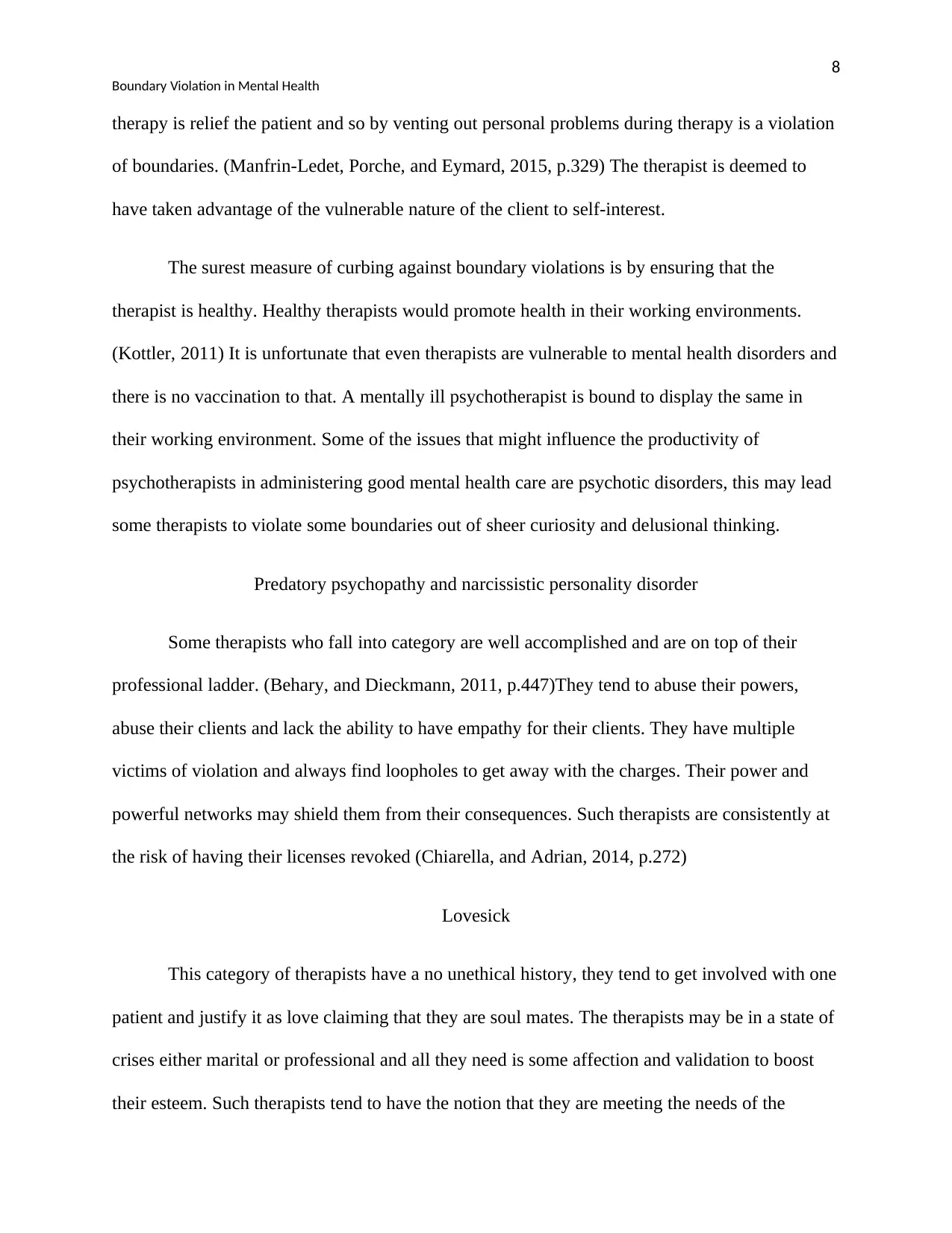
8
Boundary Violation in Mental Health
therapy is relief the patient and so by venting out personal problems during therapy is a violation
of boundaries. (Manfrin-Ledet, Porche, and Eymard, 2015, p.329) The therapist is deemed to
have taken advantage of the vulnerable nature of the client to self-interest.
The surest measure of curbing against boundary violations is by ensuring that the
therapist is healthy. Healthy therapists would promote health in their working environments.
(Kottler, 2011) It is unfortunate that even therapists are vulnerable to mental health disorders and
there is no vaccination to that. A mentally ill psychotherapist is bound to display the same in
their working environment. Some of the issues that might influence the productivity of
psychotherapists in administering good mental health care are psychotic disorders, this may lead
some therapists to violate some boundaries out of sheer curiosity and delusional thinking.
Predatory psychopathy and narcissistic personality disorder
Some therapists who fall into category are well accomplished and are on top of their
professional ladder. (Behary, and Dieckmann, 2011, p.447)They tend to abuse their powers,
abuse their clients and lack the ability to have empathy for their clients. They have multiple
victims of violation and always find loopholes to get away with the charges. Their power and
powerful networks may shield them from their consequences. Such therapists are consistently at
the risk of having their licenses revoked (Chiarella, and Adrian, 2014, p.272)
Lovesick
This category of therapists have a no unethical history, they tend to get involved with one
patient and justify it as love claiming that they are soul mates. The therapists may be in a state of
crises either marital or professional and all they need is some affection and validation to boost
their esteem. Such therapists tend to have the notion that they are meeting the needs of the
Boundary Violation in Mental Health
therapy is relief the patient and so by venting out personal problems during therapy is a violation
of boundaries. (Manfrin-Ledet, Porche, and Eymard, 2015, p.329) The therapist is deemed to
have taken advantage of the vulnerable nature of the client to self-interest.
The surest measure of curbing against boundary violations is by ensuring that the
therapist is healthy. Healthy therapists would promote health in their working environments.
(Kottler, 2011) It is unfortunate that even therapists are vulnerable to mental health disorders and
there is no vaccination to that. A mentally ill psychotherapist is bound to display the same in
their working environment. Some of the issues that might influence the productivity of
psychotherapists in administering good mental health care are psychotic disorders, this may lead
some therapists to violate some boundaries out of sheer curiosity and delusional thinking.
Predatory psychopathy and narcissistic personality disorder
Some therapists who fall into category are well accomplished and are on top of their
professional ladder. (Behary, and Dieckmann, 2011, p.447)They tend to abuse their powers,
abuse their clients and lack the ability to have empathy for their clients. They have multiple
victims of violation and always find loopholes to get away with the charges. Their power and
powerful networks may shield them from their consequences. Such therapists are consistently at
the risk of having their licenses revoked (Chiarella, and Adrian, 2014, p.272)
Lovesick
This category of therapists have a no unethical history, they tend to get involved with one
patient and justify it as love claiming that they are soul mates. The therapists may be in a state of
crises either marital or professional and all they need is some affection and validation to boost
their esteem. Such therapists tend to have the notion that they are meeting the needs of the
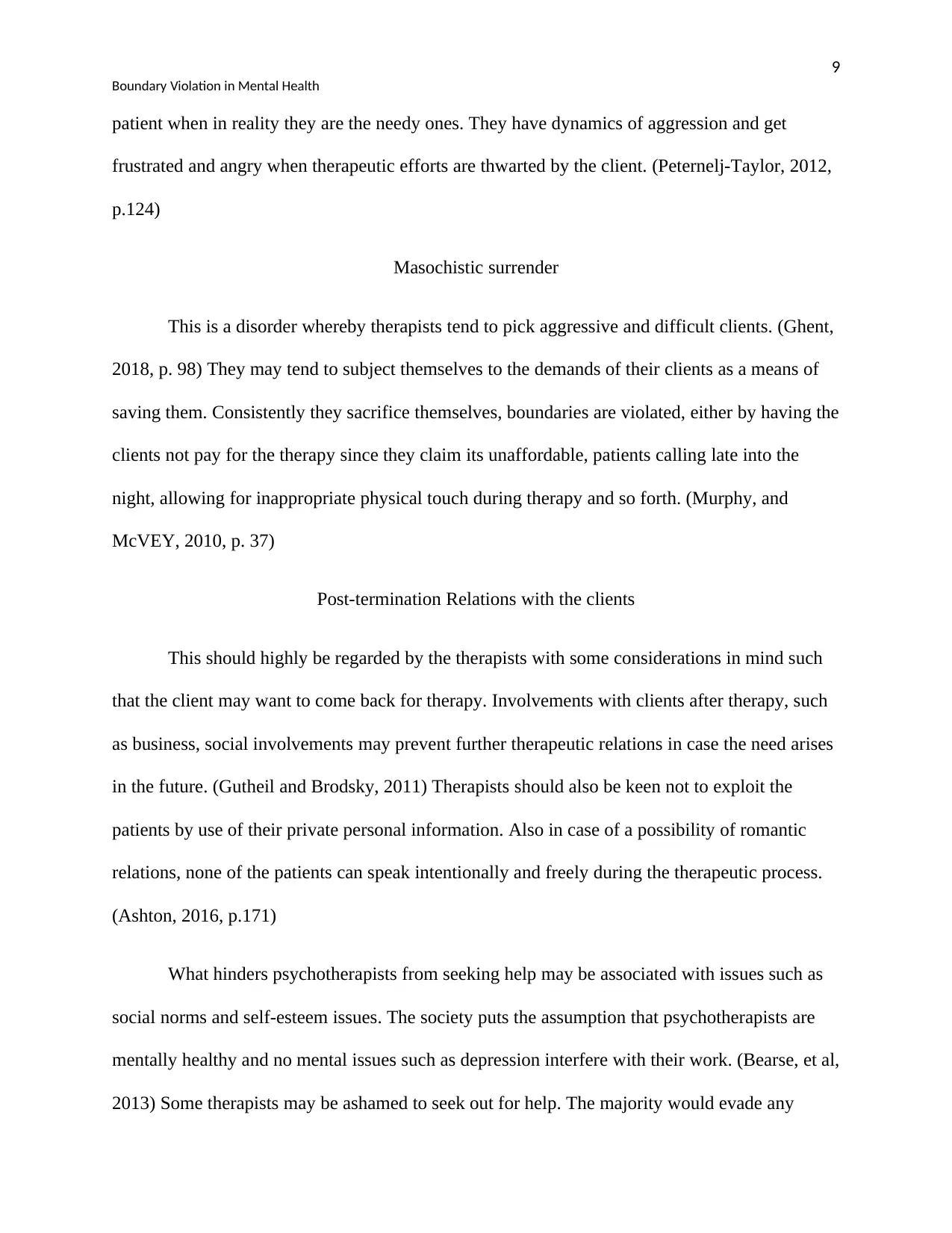
9
Boundary Violation in Mental Health
patient when in reality they are the needy ones. They have dynamics of aggression and get
frustrated and angry when therapeutic efforts are thwarted by the client. (Peternelj-Taylor, 2012,
p.124)
Masochistic surrender
This is a disorder whereby therapists tend to pick aggressive and difficult clients. (Ghent,
2018, p. 98) They may tend to subject themselves to the demands of their clients as a means of
saving them. Consistently they sacrifice themselves, boundaries are violated, either by having the
clients not pay for the therapy since they claim its unaffordable, patients calling late into the
night, allowing for inappropriate physical touch during therapy and so forth. (Murphy, and
McVEY, 2010, p. 37)
Post-termination Relations with the clients
This should highly be regarded by the therapists with some considerations in mind such
that the client may want to come back for therapy. Involvements with clients after therapy, such
as business, social involvements may prevent further therapeutic relations in case the need arises
in the future. (Gutheil and Brodsky, 2011) Therapists should also be keen not to exploit the
patients by use of their private personal information. Also in case of a possibility of romantic
relations, none of the patients can speak intentionally and freely during the therapeutic process.
(Ashton, 2016, p.171)
What hinders psychotherapists from seeking help may be associated with issues such as
social norms and self-esteem issues. The society puts the assumption that psychotherapists are
mentally healthy and no mental issues such as depression interfere with their work. (Bearse, et al,
2013) Some therapists may be ashamed to seek out for help. The majority would evade any
Boundary Violation in Mental Health
patient when in reality they are the needy ones. They have dynamics of aggression and get
frustrated and angry when therapeutic efforts are thwarted by the client. (Peternelj-Taylor, 2012,
p.124)
Masochistic surrender
This is a disorder whereby therapists tend to pick aggressive and difficult clients. (Ghent,
2018, p. 98) They may tend to subject themselves to the demands of their clients as a means of
saving them. Consistently they sacrifice themselves, boundaries are violated, either by having the
clients not pay for the therapy since they claim its unaffordable, patients calling late into the
night, allowing for inappropriate physical touch during therapy and so forth. (Murphy, and
McVEY, 2010, p. 37)
Post-termination Relations with the clients
This should highly be regarded by the therapists with some considerations in mind such
that the client may want to come back for therapy. Involvements with clients after therapy, such
as business, social involvements may prevent further therapeutic relations in case the need arises
in the future. (Gutheil and Brodsky, 2011) Therapists should also be keen not to exploit the
patients by use of their private personal information. Also in case of a possibility of romantic
relations, none of the patients can speak intentionally and freely during the therapeutic process.
(Ashton, 2016, p.171)
What hinders psychotherapists from seeking help may be associated with issues such as
social norms and self-esteem issues. The society puts the assumption that psychotherapists are
mentally healthy and no mental issues such as depression interfere with their work. (Bearse, et al,
2013) Some therapists may be ashamed to seek out for help. The majority would evade any
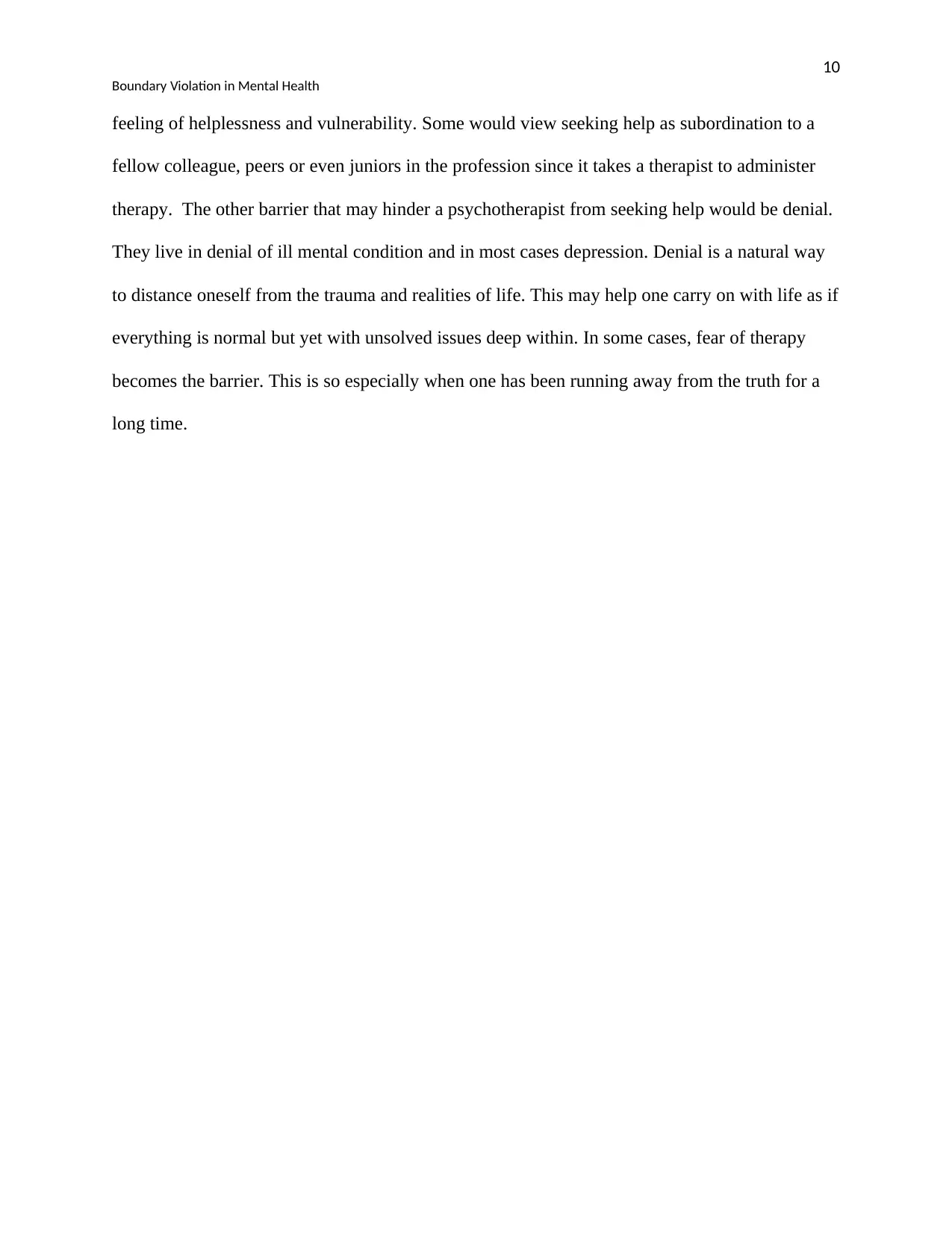
10
Boundary Violation in Mental Health
feeling of helplessness and vulnerability. Some would view seeking help as subordination to a
fellow colleague, peers or even juniors in the profession since it takes a therapist to administer
therapy. The other barrier that may hinder a psychotherapist from seeking help would be denial.
They live in denial of ill mental condition and in most cases depression. Denial is a natural way
to distance oneself from the trauma and realities of life. This may help one carry on with life as if
everything is normal but yet with unsolved issues deep within. In some cases, fear of therapy
becomes the barrier. This is so especially when one has been running away from the truth for a
long time.
Boundary Violation in Mental Health
feeling of helplessness and vulnerability. Some would view seeking help as subordination to a
fellow colleague, peers or even juniors in the profession since it takes a therapist to administer
therapy. The other barrier that may hinder a psychotherapist from seeking help would be denial.
They live in denial of ill mental condition and in most cases depression. Denial is a natural way
to distance oneself from the trauma and realities of life. This may help one carry on with life as if
everything is normal but yet with unsolved issues deep within. In some cases, fear of therapy
becomes the barrier. This is so especially when one has been running away from the truth for a
long time.
Secure Best Marks with AI Grader
Need help grading? Try our AI Grader for instant feedback on your assignments.
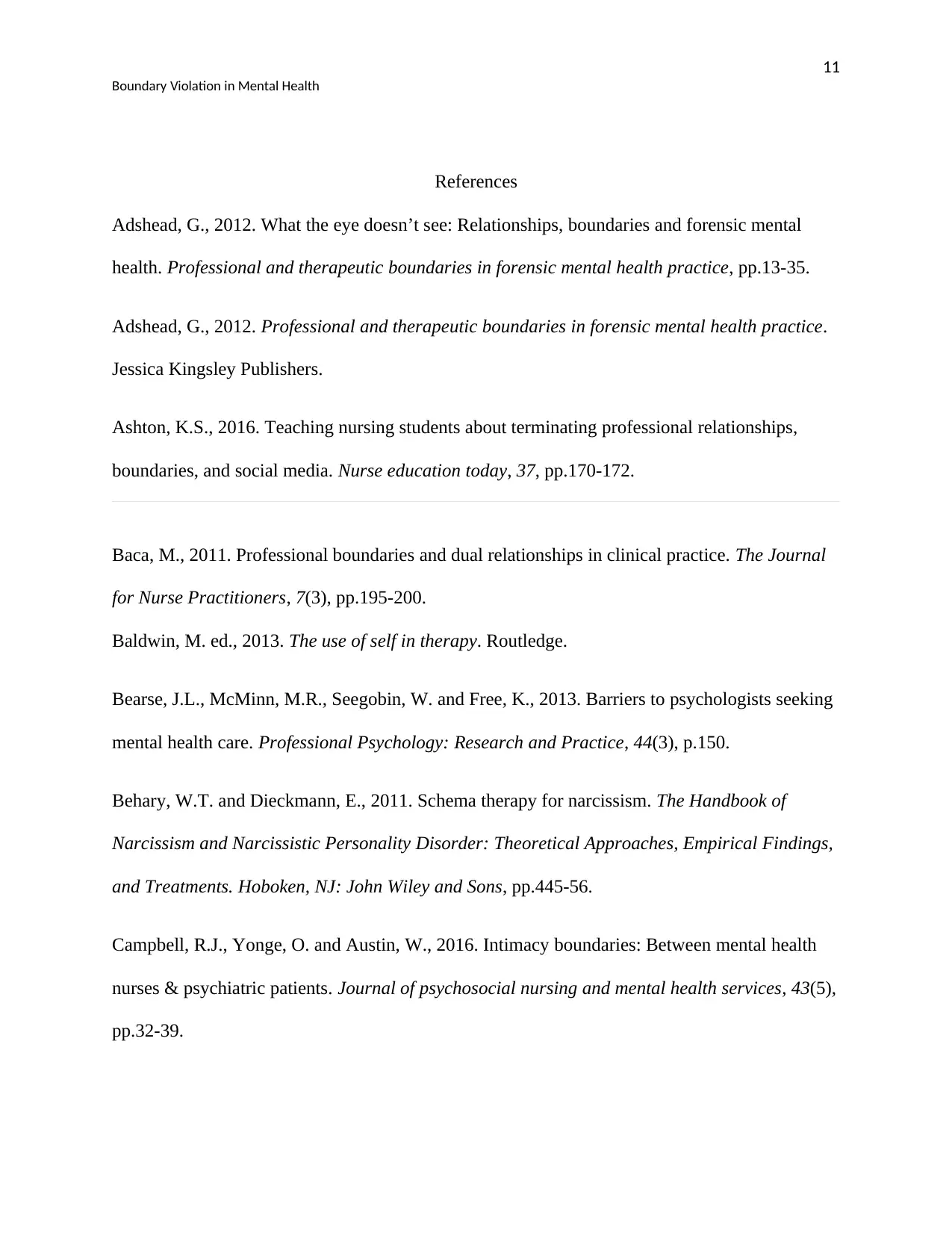
11
Boundary Violation in Mental Health
References
Adshead, G., 2012. What the eye doesn’t see: Relationships, boundaries and forensic mental
health. Professional and therapeutic boundaries in forensic mental health practice, pp.13-35.
Adshead, G., 2012. Professional and therapeutic boundaries in forensic mental health practice.
Jessica Kingsley Publishers.
Ashton, K.S., 2016. Teaching nursing students about terminating professional relationships,
boundaries, and social media. Nurse education today, 37, pp.170-172.
Baca, M., 2011. Professional boundaries and dual relationships in clinical practice. The Journal
for Nurse Practitioners, 7(3), pp.195-200.
Baldwin, M. ed., 2013. The use of self in therapy. Routledge.
Bearse, J.L., McMinn, M.R., Seegobin, W. and Free, K., 2013. Barriers to psychologists seeking
mental health care. Professional Psychology: Research and Practice, 44(3), p.150.
Behary, W.T. and Dieckmann, E., 2011. Schema therapy for narcissism. The Handbook of
Narcissism and Narcissistic Personality Disorder: Theoretical Approaches, Empirical Findings,
and Treatments. Hoboken, NJ: John Wiley and Sons, pp.445-56.
Campbell, R.J., Yonge, O. and Austin, W., 2016. Intimacy boundaries: Between mental health
nurses & psychiatric patients. Journal of psychosocial nursing and mental health services, 43(5),
pp.32-39.
Boundary Violation in Mental Health
References
Adshead, G., 2012. What the eye doesn’t see: Relationships, boundaries and forensic mental
health. Professional and therapeutic boundaries in forensic mental health practice, pp.13-35.
Adshead, G., 2012. Professional and therapeutic boundaries in forensic mental health practice.
Jessica Kingsley Publishers.
Ashton, K.S., 2016. Teaching nursing students about terminating professional relationships,
boundaries, and social media. Nurse education today, 37, pp.170-172.
Baca, M., 2011. Professional boundaries and dual relationships in clinical practice. The Journal
for Nurse Practitioners, 7(3), pp.195-200.
Baldwin, M. ed., 2013. The use of self in therapy. Routledge.
Bearse, J.L., McMinn, M.R., Seegobin, W. and Free, K., 2013. Barriers to psychologists seeking
mental health care. Professional Psychology: Research and Practice, 44(3), p.150.
Behary, W.T. and Dieckmann, E., 2011. Schema therapy for narcissism. The Handbook of
Narcissism and Narcissistic Personality Disorder: Theoretical Approaches, Empirical Findings,
and Treatments. Hoboken, NJ: John Wiley and Sons, pp.445-56.
Campbell, R.J., Yonge, O. and Austin, W., 2016. Intimacy boundaries: Between mental health
nurses & psychiatric patients. Journal of psychosocial nursing and mental health services, 43(5),
pp.32-39.
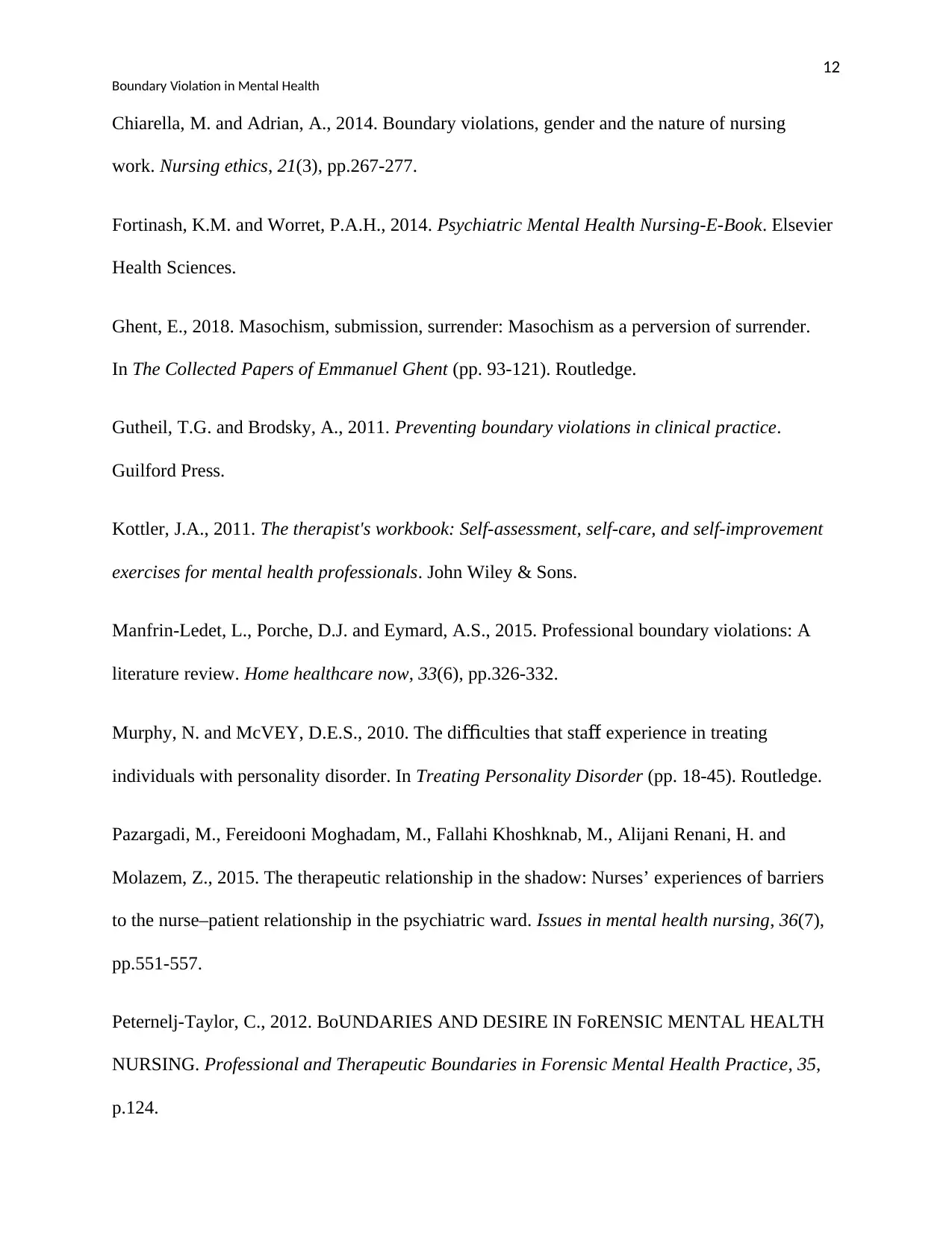
12
Boundary Violation in Mental Health
Chiarella, M. and Adrian, A., 2014. Boundary violations, gender and the nature of nursing
work. Nursing ethics, 21(3), pp.267-277.
Fortinash, K.M. and Worret, P.A.H., 2014. Psychiatric Mental Health Nursing-E-Book. Elsevier
Health Sciences.
Ghent, E., 2018. Masochism, submission, surrender: Masochism as a perversion of surrender.
In The Collected Papers of Emmanuel Ghent (pp. 93-121). Routledge.
Gutheil, T.G. and Brodsky, A., 2011. Preventing boundary violations in clinical practice.
Guilford Press.
Kottler, J.A., 2011. The therapist's workbook: Self-assessment, self-care, and self-improvement
exercises for mental health professionals. John Wiley & Sons.
Manfrin-Ledet, L., Porche, D.J. and Eymard, A.S., 2015. Professional boundary violations: A
literature review. Home healthcare now, 33(6), pp.326-332.
Murphy, N. and McVEY, D.E.S., 2010. The difficulties that staff experience in treating
individuals with personality disorder. In Treating Personality Disorder (pp. 18-45). Routledge.
Pazargadi, M., Fereidooni Moghadam, M., Fallahi Khoshknab, M., Alijani Renani, H. and
Molazem, Z., 2015. The therapeutic relationship in the shadow: Nurses’ experiences of barriers
to the nurse–patient relationship in the psychiatric ward. Issues in mental health nursing, 36(7),
pp.551-557.
Peternelj-Taylor, C., 2012. BoUNDARIES AND DESIRE IN FoRENSIC MENTAL HEALTH
NURSING. Professional and Therapeutic Boundaries in Forensic Mental Health Practice, 35,
p.124.
Boundary Violation in Mental Health
Chiarella, M. and Adrian, A., 2014. Boundary violations, gender and the nature of nursing
work. Nursing ethics, 21(3), pp.267-277.
Fortinash, K.M. and Worret, P.A.H., 2014. Psychiatric Mental Health Nursing-E-Book. Elsevier
Health Sciences.
Ghent, E., 2018. Masochism, submission, surrender: Masochism as a perversion of surrender.
In The Collected Papers of Emmanuel Ghent (pp. 93-121). Routledge.
Gutheil, T.G. and Brodsky, A., 2011. Preventing boundary violations in clinical practice.
Guilford Press.
Kottler, J.A., 2011. The therapist's workbook: Self-assessment, self-care, and self-improvement
exercises for mental health professionals. John Wiley & Sons.
Manfrin-Ledet, L., Porche, D.J. and Eymard, A.S., 2015. Professional boundary violations: A
literature review. Home healthcare now, 33(6), pp.326-332.
Murphy, N. and McVEY, D.E.S., 2010. The difficulties that staff experience in treating
individuals with personality disorder. In Treating Personality Disorder (pp. 18-45). Routledge.
Pazargadi, M., Fereidooni Moghadam, M., Fallahi Khoshknab, M., Alijani Renani, H. and
Molazem, Z., 2015. The therapeutic relationship in the shadow: Nurses’ experiences of barriers
to the nurse–patient relationship in the psychiatric ward. Issues in mental health nursing, 36(7),
pp.551-557.
Peternelj-Taylor, C., 2012. BoUNDARIES AND DESIRE IN FoRENSIC MENTAL HEALTH
NURSING. Professional and Therapeutic Boundaries in Forensic Mental Health Practice, 35,
p.124.
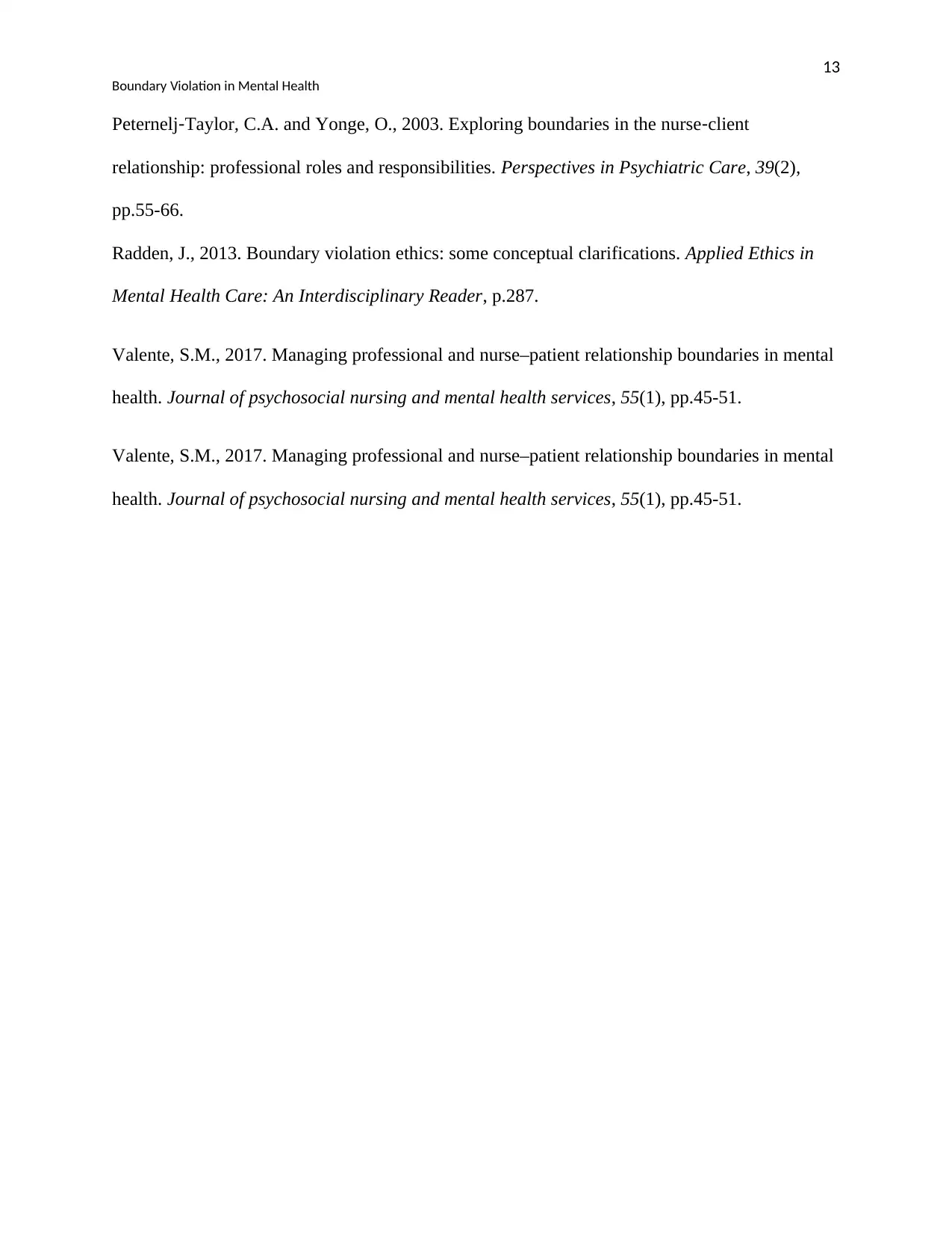
13
Boundary Violation in Mental Health
Peternelj‐Taylor, C.A. and Yonge, O., 2003. Exploring boundaries in the nurse‐client
relationship: professional roles and responsibilities. Perspectives in Psychiatric Care, 39(2),
pp.55-66.
Radden, J., 2013. Boundary violation ethics: some conceptual clarifications. Applied Ethics in
Mental Health Care: An Interdisciplinary Reader, p.287.
Valente, S.M., 2017. Managing professional and nurse–patient relationship boundaries in mental
health. Journal of psychosocial nursing and mental health services, 55(1), pp.45-51.
Valente, S.M., 2017. Managing professional and nurse–patient relationship boundaries in mental
health. Journal of psychosocial nursing and mental health services, 55(1), pp.45-51.
Boundary Violation in Mental Health
Peternelj‐Taylor, C.A. and Yonge, O., 2003. Exploring boundaries in the nurse‐client
relationship: professional roles and responsibilities. Perspectives in Psychiatric Care, 39(2),
pp.55-66.
Radden, J., 2013. Boundary violation ethics: some conceptual clarifications. Applied Ethics in
Mental Health Care: An Interdisciplinary Reader, p.287.
Valente, S.M., 2017. Managing professional and nurse–patient relationship boundaries in mental
health. Journal of psychosocial nursing and mental health services, 55(1), pp.45-51.
Valente, S.M., 2017. Managing professional and nurse–patient relationship boundaries in mental
health. Journal of psychosocial nursing and mental health services, 55(1), pp.45-51.
1 out of 13
![[object Object]](/_next/static/media/star-bottom.7253800d.svg)





